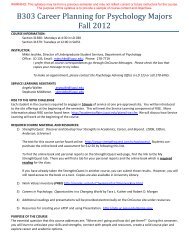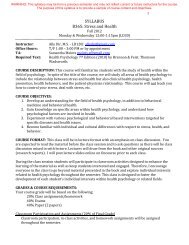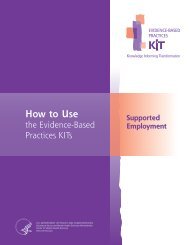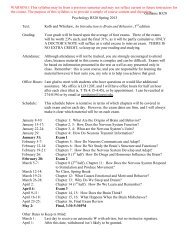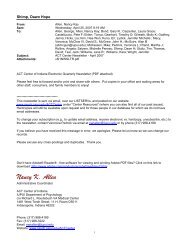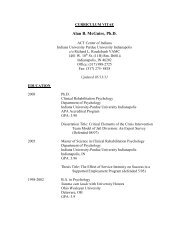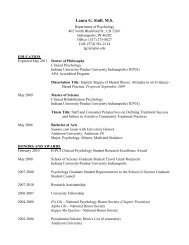Supported Employment: Training Frontline Staff - SAMHSA Store ...
Supported Employment: Training Frontline Staff - SAMHSA Store ...
Supported Employment: Training Frontline Staff - SAMHSA Store ...
Create successful ePaper yourself
Turn your PDF publications into a flip-book with our unique Google optimized e-Paper software.
Practice principles of<br />
<strong>Supported</strong> <strong>Employment</strong><br />
SE programs are based on a core set of practice<br />
principles. These principles form the foundation of<br />
the program.<br />
Practice principles of SE<br />
• Eligibility is based on consumer choice.<br />
• SE services are integrated with comprehensive<br />
mental health treatment.<br />
• Competitive employment is the goal.<br />
Principle 1: Eligibility is based on<br />
consumer choice<br />
All consumers who want to participate in SE are<br />
eligible—no one is excluded. Consumers who<br />
are interested in work are not prevented from<br />
participating in SE regardless of their psychiatric<br />
diagnosis, symptoms, work history, or other<br />
problems, including substance abuse and cognitive<br />
impairment.<br />
The core philosophy of SE is that all consumers can<br />
work at competitive jobs in the community without<br />
prior training, and no one should be excluded from<br />
this opportunity.<br />
SE does not try to bring consumers to some<br />
preconceived standard of “work readiness” before<br />
they seek employment. Consumers are “work<br />
ready” when they say they want to work. Research<br />
shows that symptoms, substance abuse, and other<br />
consumer factors are not strong and consistent<br />
barriers to work when consumers receive assistance<br />
from an SE program. Therefore, no justification<br />
exists for excluding consumers who are interested<br />
in work from SE programs.<br />
• Personalized benefits counseling is important.<br />
• Job searches start soon after consumers<br />
express interest in working.<br />
• Follow-along supports are continuous.<br />
• Consumer preferences are important.<br />
Principle 2: SE services are integrated with<br />
comprehensive mental health treatment<br />
Closely coordinating SE services with other<br />
mental health rehabilitation and clinical treatment<br />
ensures that all mental health practitioners (not<br />
just the employment specialist) support consumers’<br />
vocational goals. For this reason, it is important that<br />
you participate regularly in clinical treatment team<br />
meetings.<br />
Participating in team meetings gives you a vehicle<br />
to discuss clinical and rehabilitation issues relevant<br />
to work, such as the following:<br />
• Medication side effects;<br />
• Persistent symptoms (e.g., hallucinations);<br />
• Cognitive difficulties; or<br />
• Other rehabilitation needs (e.g., skills training to<br />
improve ability to socialize with co-workers or<br />
self-assertion skills).<br />
Moreover, regular contact with team members<br />
(phone or face-to-face meetings) also allows you to<br />
help consumers achieve vocational goals.<br />
<strong>Training</strong> Basic Elements <strong>Frontline</strong> and <strong>Staff</strong> Practice Principles 5 Module 1



